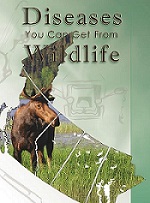What to do if you find sick, injured, or dead wildlife
This page provides information on what to do if you find sick, injured, or dead wildlife.
On this page:
- General information on sick, injured, or dead wildlife
- How to report a sick, injured, or dead animal:
- Further information on wildlife health
General information on sick, injured, or dead wildlife
If you suspect wildlife may be dangerous:
Please call the Conservation Officer Service’s 24/7 Report All Poachers and Polluters (RAPP) hotline at 1-877-952-7277.
If you find sick, injured, or dead wildlife, please:
- Take photos or a video of the wildlife for assessment
- Note the location of the wildlife
- Do not handle the animal
It is illegal to possess live or dead wildlife in British Columbia without a permit. See below for information on how to report different wildlife species.
How to report a sick, injured, or dead animal:
Sick or injured wildlife must not be moved or touched without instructions from a wildlife professional. Sick or injured animals can become more stressed if handled incorrectly.
- Do not touch or move dead wildlife with your bare hands. Use disposable gloves and, if necessary, move wildlife with a tool or garbage bag
- Do not dispose of dead wildlife in your green/compost bin
- Check your local municipality for information on carcass disposal
For more information on handling carcasses while hunting, please see our infographic on Safe Game Meat Handling (PDF, 149 KB)
Amphibians (example: frog, toads, salamanders)
Sick, injured, or dead frogs or other amphibians:
- Every observation is important. Any information about frogs, toads, salamanders, snakes, lizards and turtles helps us to identify trends, areas of conservation concern and measures that need to be taken.
- Some wildlife rehabilitation centres will take amphibians. Search the Wildlife Rehabilitator’s Network of B.C.
- Report sick, injured, or dead frogs and other amphibians to BC Frogwatch
Bats
Sick, injured, or dead bats:
- Do not touch bats. If a human or pet has contacted or potentially contacted a bat, follow the advice on the Bat Health page.
- For sick or injured bats, leave the animal where it is and call your local accredited rescue and rehabilitation centre by searching the Wildlife Rehabilitator’s Network of B.C.
- Dead bats that have not been in direct contact with humans or pets can be reported to the B.C. Community Bat Program at 1-855-922-2287 or info@bcbats.ca.
Birds
Sick or injured birds:
- If a bird is injured or suspected orphaned, please leave the animal where it is and call your local accredited rescue and rehabilitation centre: The Wildlife Rehabilitator’s Network of B.C
Dead birds:
- Provincial and federal wildlife agencies are working together to monitor bird health.
- Report dead birds to the 24/7 Wild Avian Mortality Investigation Hotline at 1-866-431-BIRD (2473)
Small mammals (example: raccoons, rabbits, squirrels)
Sick or injured small mammals:
- If a small animal is injured or suspected orphaned, please leave the animal where it is and call:
- A local accredited rescue and rehabilitation centre: Wildlife Rehabilitator’s Network of B.C., or
- The B.C. SPCA Wildlife Line: 1-855-622-7722
Dead small mammals:
- Dead wildlife with suspected illness should be reported to Wildlife Health: 250-751-7246
Large mammals (example: deer, elk, sheep, bears)
Wildlife with suspected illness should be reported to the B.C. Wildlife Health Program: 250-751-7246
Sick or injured large mammals:
- Rehabilitation centres may not be able to take large or adult mammals. Check the Wildlife Rehabilitator’s Network of B.C. for a local rehabilitation centre that may be able to assist.
- If you are concerned about an injured large animal, leave the animal where it is and call the Report All Poachers and Polluters (RAPP) line: 1-877-952-7277
Dead large mammals:
- Report dead deer and other wildlife to local Public Works, Road Maintenance, or Animal Control departments for removal. If the deer is on private property, it may be your responsibility to dispose. Please contact your local municipality for more information
Marine mammals/Sea turtles
Injured or dead marine mammals:
- To report injured or dead marine mammals (dolphins, porpoises, whales, seals, sea lions) or sea turtles, contact the federal Department of Oceans and Fisheries,
- Or, you can contact the BC Marine Mammal Response Network at 1-800-465-4336 or DFO.ORR-ONS.MPO@dfo-mpo.gc.ca.
Further information on wildlife health
For more information on wildlife health in British Columbia or if you are unsure of what to do if you have found sick, injured, or dead wildlife:
- Call the Wildlife Health Program at 250-751-7246
- Email: Caeley.Thacker@gov.bc.ca
Read the booklet Diseases You Can Get From Wildlife (PDF, 8.6MB)
Learn about Safe Game Meat Handling (PDF, 149 KB)
Learn more about wildlife health and diseases here:

